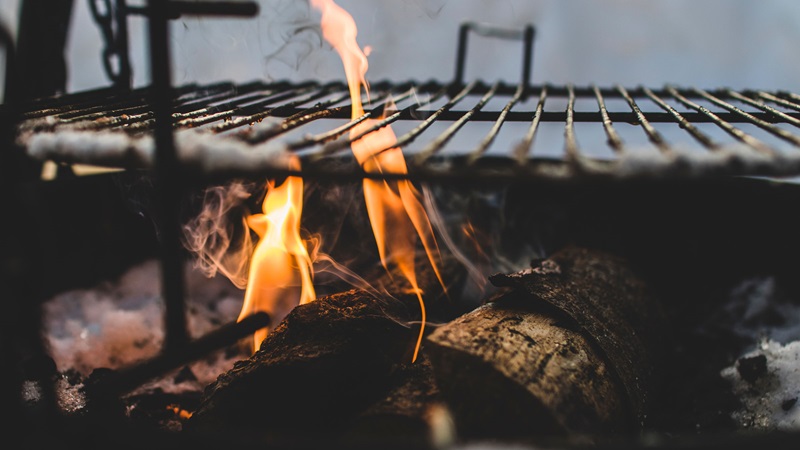Sometimes we earn a few cents when you click on a link.
Outdoor Cooking In Colder Weather – Tips And Ideas

As temperatures drop and the days grow shorter, many grill enthusiasts store away their equipment, waiting for warmer weather to return. But grilling in the winter has its own unique charm. Whether you’re hosting a winter BBQ or simply want to continue your weekend grilling tradition, cooking outdoors in cold weather is entirely possible—and rewarding. Here’s how to get the most out of it.
Key Takeaway:
Outdoor cooking in colder weather can be just as enjoyable as grilling during warmer months, but it requires a few adjustments to ensure success. With the right gear, fuel, and techniques, you can savor delicious grilled and smoked meals all winter long.
For more tips on winter grilling, recipes, and tips, I recommend visiting https://thegrillingdutchman.com/ after finishing this article
1. Choose the Right Equipment
Grilling in cold weather can be more demanding on your grill or smoker. You’ll need a unit that retains heat efficiently and can handle the chill in the air. Here are a few tips:
- Use a well-insulated grill: Ceramic Kamado grills, pellet smokers, or well-insulated gas grills work best in cold conditions.
- Consider a grill cover: A cover helps retain heat and protects your grill from wind or snow.
- Use windbreakers: If the wind is blowing strongly, setting up a windbreak around your cooking area can help prevent temperature fluctuations.
2. Preheat Longer
Cold metal takes longer to heat up, so be prepared to give your grill extra time to preheat. Start your grill or smoker earlier than usual to reach the desired cooking temperature, and use a grill thermometer to monitor it closely.
- Charcoal Grills: Start with extra charcoal, as maintaining high temperatures in the cold can require more fuel.
- Gas Grills: Be patient, as they can take longer to reach peak heat.
3. Keep the Lid Closed
Resist the temptation to check your food too often. Every time you open the lid, you let precious heat escape. This is especially important when the outside temperature is low. Instead, rely on a wireless meat thermometer to keep an eye on your food without lifting the lid.
4. Use the Right Fuel
Cold weather cooking can demand more fuel:
- For Charcoal Grills: Use high-quality, lump charcoal that burns hotter and longer than briquettes.
- For Gas Grills: Ensure your propane tank is full. Cold temperatures can reduce the efficiency of gas, and you’ll go through fuel faster than you would in warmer weather.
- For Pellet Grills: Keep your pellets dry and consider using a high-heat blend.
5. Adjust Cooking Times
Cold weather can affect cooking times. Plan for your food to take longer to cook, and factor in the extra time it takes to maintain a consistent temperature. Meat can also cool down faster once removed from the grill, so have a warm space ready to rest your meat before serving.
6. Dress Appropriately
Since you’ll be outside for an extended period, make sure you’re dressed warmly:
- Layer up: Insulated jackets, hats, and gloves are a must.
- Protect your hands: Use heat-resistant gloves that allow you to handle grill tools while keeping your fingers warm.
7. Light it Up
Winter means shorter days, so it’s crucial to ensure proper lighting for outdoor cooking:
- Headlamps or grill lights can keep your cooking space well-lit.
- Make sure your cooking station is safe and visible, especially if snow or ice is present.
8. Winterize Your Grill
After each cookout, it’s important to maintain your grill properly, especially in colder weather:
- Clean your grill thoroughly after use to avoid grease buildup.
- Cover your grill to protect it from the elements when not in use.
- Check for ice or snow buildup on the grill components before starting.

FAQs:
Q: Can I still use a propane grill in winter?
A: Yes! Propane grills work in winter, but propane can take longer to vaporize in cold temperatures. Keep your tank full, and consider storing it in a warmer area before use.
Q: Do I need to use more charcoal or pellets in cold weather?
A: Yes, cooking in the cold generally requires more fuel because grills have to work harder to maintain high temperatures. Plan to use 25-50% more fuel than you would in warmer months.
Q: How do I prevent my food from getting cold after cooking?
A: To prevent rapid cooling, bring your cooked food indoors as quickly as possible. Use an insulated serving tray or wrap your food in aluminum foil to help retain heat.
With a few tweaks and some preparation, outdoor cooking in colder weather can be just as satisfying as any summer grilling session. Embrace the chill and enjoy the flavors that winter grilling brings!
For more tips, look at our outdoor category.
Eddie Aiken
Blending technical expertise with hands-on experience, Eddie Aiken offers meticulous product reviews and tips for the modern homeowner. A trusted voice in home and garden essentials, Eddie’s insights ensure you make informed choices for your living space. When he’s not evaluating the latest products, he’s refining his home oasis. Your ideal living space is just a recommendation away with Eddie Aiken.
